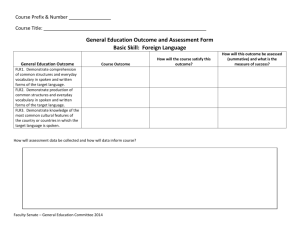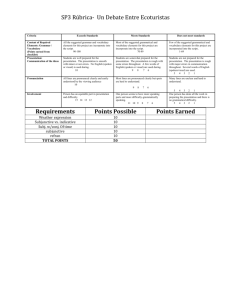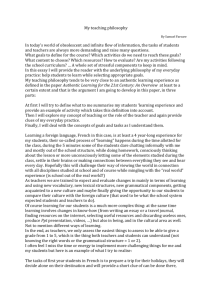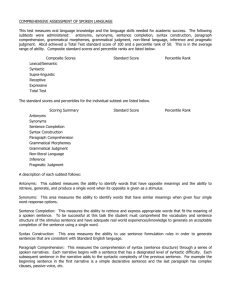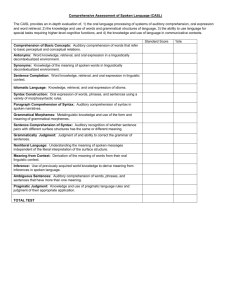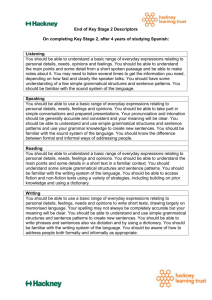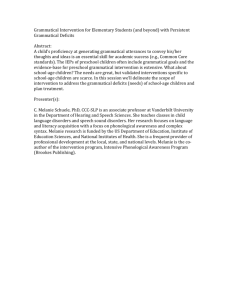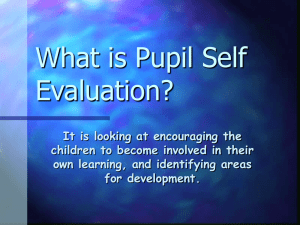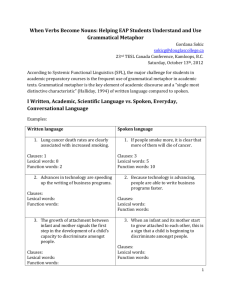SP FR GE 425
advertisement
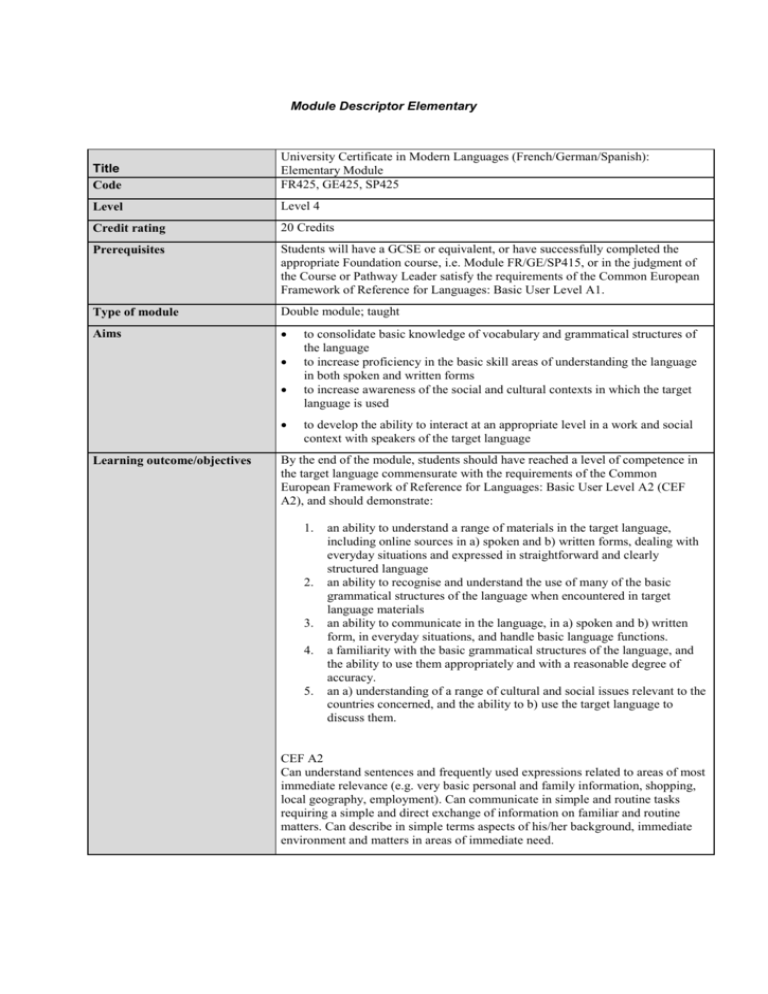
Module Descriptor Elementary Title Code University Certificate in Modern Languages (French/German/Spanish): Elementary Module FR425, GE425, SP425 Level Level 4 Credit rating 20 Credits Prerequisites Students will have a GCSE or equivalent, or have successfully completed the appropriate Foundation course, i.e. Module FR/GE/SP415, or in the judgment of the Course or Pathway Leader satisfy the requirements of the Common European Framework of Reference for Languages: Basic User Level A1. Type of module Double module; taught Aims Learning outcome/objectives to consolidate basic knowledge of vocabulary and grammatical structures of the language to increase proficiency in the basic skill areas of understanding the language in both spoken and written forms to increase awareness of the social and cultural contexts in which the target language is used to develop the ability to interact at an appropriate level in a work and social context with speakers of the target language By the end of the module, students should have reached a level of competence in the target language commensurate with the requirements of the Common European Framework of Reference for Languages: Basic User Level A2 (CEF A2), and should demonstrate: 1. 2. 3. 4. 5. an ability to understand a range of materials in the target language, including online sources in a) spoken and b) written forms, dealing with everyday situations and expressed in straightforward and clearly structured language an ability to recognise and understand the use of many of the basic grammatical structures of the language when encountered in target language materials an ability to communicate in the language, in a) spoken and b) written form, in everyday situations, and handle basic language functions. a familiarity with the basic grammatical structures of the language, and the ability to use them appropriately and with a reasonable degree of accuracy. an a) understanding of a range of cultural and social issues relevant to the countries concerned, and the ability to b) use the target language to discuss them. CEF A2 Can understand sentences and frequently used expressions related to areas of most immediate relevance (e.g. very basic personal and family information, shopping, local geography, employment). Can communicate in simple and routine tasks requiring a simple and direct exchange of information on familiar and routine matters. Can describe in simple terms aspects of his/her background, immediate environment and matters in areas of immediate need. Content (for contact time and non-contact time) This module develops receptive skills (understanding the spoken and written language), using texts expressed straightforwardly in authentic or semi-authentic language based on the material covered in this and previous module, and including material on cultural and social matters. It also develops productive skills (i.e. speaking and writing the language), using the language studied in this and the previous module. study and practice of further key grammatical features, vocabulary and conversational language development of listening and reading skills further study of cultural and social matters using target language texts based on the language studied in this and previous modules development of speaking and writing skills, both in a personal context and with reference to the cultures and societies of the target language countries Teaching and learning strategies Work will be in groups with emphasis on interaction in the target language. There will be reinforcement of language through a range of tasks set for group work in class and independent study – the suggested amount of independent study is three hours per week. Learning support Module Unit: a course textbook which students will be asked to acquire; French: Motifs, K.Jansma&M.A.Kassen, Heinle, ISBN-13: 978-1-4130-2981-9; ISBN-10: 1-4130-2981-7 German: Willkomnen, P.Coggle, Harper-Arnold, ISBN: 0-340-64808-2 Spanish: Aula Internacional 1, Corpas, Garcia, Garmendia, Soriano, Difusion, ISBN: 9788484432289; authentic material (printed, audio, video); supplementary grammar notes; supplementary recorded material. Studentcentral: course support materials; e-grammar; reading texts; e-books; edictionaries; phonetics; audio and visual material; e-newspapers; internet links; podcasts. Libraries at Falmer and Aldrich: course related materials – reference books and ebooks; print and e-journals; audiovisual material; online databases; links to websites; leaflets and guides. Assessment tasks Tasks 100% Task 1: Listening comprehension (25%) 1 or 2 recorded extracts of authentic or semi-authentic spoken language, based on the topics and structures covered in this and earlier modules, in audio or video format. Duration of recorded material: 3-4 minutes. Each extract will be played uninterrupted up to 3 times, with time allowed after each playing for notes and answers to be written down. Duration of task overall: 30 minutes approx. Questions and answers in English. Dictionaries: none permitted Task 2: Reading comprehension (25%) 1 or 2 pieces of authentic or semi-authentic reading material, using language based on the topics and structures covered in this and earlier modules. Duration of task overall: 30 minutes. Questions and answers in English. Dictionaries: none permitted Assessments 1 & 2 will normally take place in the last weeks of Semester 1. Task 3: Speaking – Role-play (30%) A prepared but unscripted role-play task in a group of 2 or 3 participants, in a situation based on the topics and structures covered in this and earlier modules. Duration of individual contribution: 3-4 minutes Task 4: Writing (20%) A communicative or descriptive piece of writing, using language based on the topics and structures covered in this and earlier modules. Length of text to be written: 150 words approx. Duration of task: 50 minutes. Dictionaries: none permitted Assessments 3 & 4 will normally take place in the last weeks of Semester 2. Assessment criteria Task 1: Listening comprehension (25%) In their answers, students should be able to demonstrate: 1. 2. 3. an understanding of a range of spoken materials in the target language, including online sources dealing with everyday situations and expressed in straightforward and clearly structured language (LO1a) a ability to recognise and understand the use of many of the basic grammatical structures of the target language in its spoken form (LO2) an understanding of a range of cultural and social issues relevant to the countries concerned (LO5a) Task 2: Reading comprehension (25%) In their answers, students should be able to demonstrate: 1. 2. 3. an understanding of a range of written materials in the target language including online texts, dealing with everyday situations and expressed in straightforward and clearly structured language (LO1b) a ability to recognise and understand the use of many of the basic grammatical structures of the target language in its written form (LO2) an understanding of a range of cultural and social issues relevant to the countries concerned (LO5a) Task 3: Speaking – Role-play (30%) In their speaking, students should be able to demonstrate 1. 2. 3. an ability to communicate in the spoken form of the language, in everyday situations, and handle basic language functions (LO3a) a familiarity with the basic grammatical structures of the language, and the ability to use them appropriately and with a reasonable degree of accuracy (LO4) an understanding of a range of cultural and social issues relevant to the countries concerned, and the ability to use the target language to discuss them (LO5b) Task 4: Writing (20%) In their writing, students should be able to demonstrate 1. 2. 3 an ability to communicate in the written form of the language, in everyday situations, and handle basic language functions (LO3b) a familiarity with the basic grammatical structures of the language, and the ability to use them appropriately and with a reasonable degree of accuracy (LO4) an understanding of a range of cultural and social issues relevant to the countries concerned and the ability to use the target language to discuss them (LO5b)
